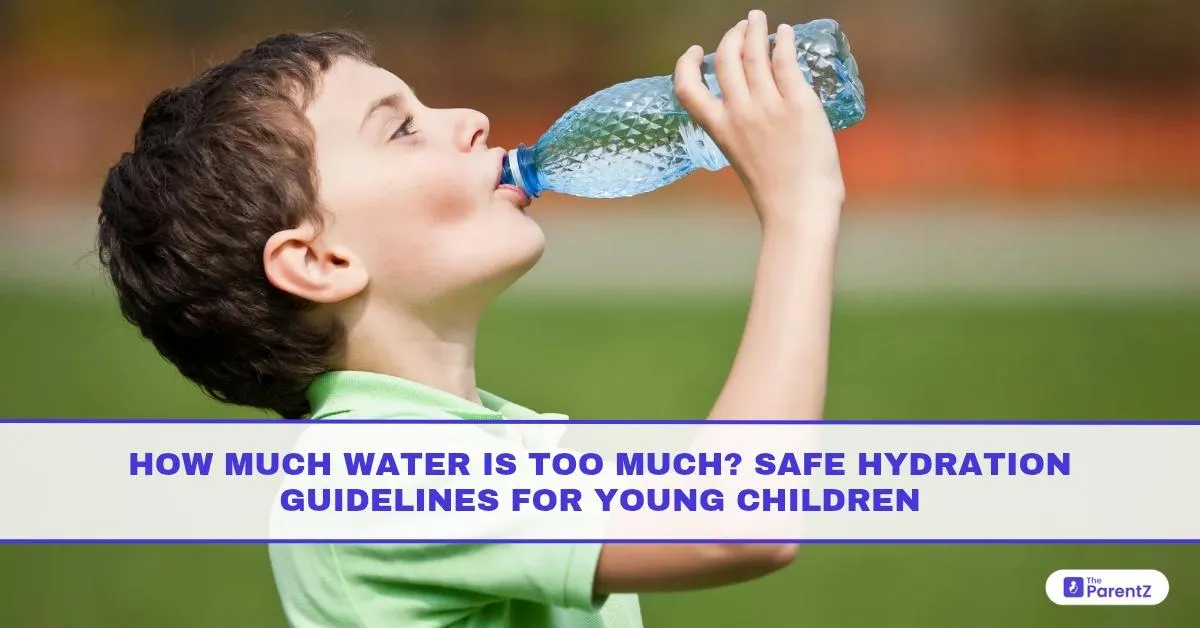A Glass Too Full: Why Even Water Needs Limits for Children
Water is often seen as the simplest, safest thing we can give our children. It’s calorie-free, natural, and essential for life. But like most good things, too much water can become a problem, especially for young children.
As toddlers grow and explore, parents often wonder:
- How much water should my child drink?
- Can too much water be harmful?
- Are milk and juices included in daily fluid intake?
Why Water Matters (But Also Has Limits)
Children are more vulnerable to both dehydration and overhydration because:
- Their bodies are smaller.
- Their thirst signals aren’t always reliable.
- Their kidneys are still maturing, especially in the first few years.
While dehydration gets more attention (and rightfully so), overhydration—or water intoxication—is a lesser-known but real danger when fluid intake exceeds what their body can manage, diluting sodium levels in the blood.
According to the American Academy of Pediatrics (AAP) and the Indian Academy of Pediatrics (IAP), the goal is balanced hydration, not just “more is better.”
How Much Water Do Children Really Need?
These guidelines consider water from all sources—including food, breast milk, formula, milk, and plain water. Let’s break it down by age.
Birth to 6 Months
- Water Intake Recommendation: No additional water.
- Why: Breast milk or formula provides all the hydration a baby needs. Their kidneys cannot handle extra water.
Giving plain water can lead to water intoxication. Avoid even small sips.
6–12 Months
- Water Intake Recommendation: Up to 120 ml (4 oz) per day.
- Why: Babies start solid foods and can slowly be introduced to sips of water—usually during meals. But breast milk or formula still remains their main fluid source.
Pediatrician Dr. Radhika Sharma shares:
“Parents often think they need to replace milk with water once solids start, but that’s not the case. Milk still provides vital hydration and nutrition.”
1–3 Years (Toddlers)
- Recommended Water Intake: Around 1.3 liters (1300 ml) per day from all fluids and food.
- Plain water portion: About 500–600 ml daily.
- Why: Toddlers become more active and need more fluids. Offer small sips throughout the day, and more during hot weather or active play.
Include water-rich fruits (like watermelon, oranges) and soups to support hydration naturally.
4–8 Years (Preschool and Early Primary)
- Recommended Water Intake: 1.6 liters (1600 ml) total per day
- Plain water portion: About 800–1000 ml
- Encourage frequent, small drinks of water, especially before outdoor play or school sports.
Tip: Let your child pick out their own fun water bottle; it encourages better water habits!
Signs of Overhydration in Children
Yes, it’s rare, but it happens, especially when:
- Parents or caregivers push water excessively, fearing dehydration
- Children are forced to drink too much water before meals or after activity
- Daycare or school settings unintentionally over-encourage water breaks
Watch for:
- Puffy face, hands, or feet
- Nausea, vomiting
- Irritability or drowsiness
- Frequent, very clear urination
- Confusion or unusual behavior
- Seizures in extreme cases
If you suspect your child has consumed too much water and shows any of these signs, seek immediate medical attention.
Healthy Hydration: What Counts Toward Fluids?
Not just water! These all count:
- Breast milk and formula
- Cow’s milk (after 1 year)
- Soups, porridges, and dal water
- Fruits and vegetables with high water content
- Buttermilk, coconut water (after 1 year, in moderation)
Avoid or limit:
- Sugary juices (can lead to cavities and obesity)
- Caffeinated drinks
- Packaged electrolyte drinks (unless prescribed)
Smart Tips for Parents
1. Follow thirst cues
Don’t force children to drink if they’re not thirsty—unless they’re in hot conditions, sick, or sweating heavily.
2. Offer water at regular times
Like after waking, before and after meals, and during playtime.
3. Monitor urine output
Pale yellow urine 4–6 times a day is a good sign of adequate hydration.
4. Don’t use water as a bribe
Avoid offering too much water before meals to “fill up” picky eaters.
5. Educate caregivers
Ensure babysitters, grandparents, or teachers understand how much is too much.
Real Parent Experiences
Anika, a mother of two in Delhi, recalls:
“During a summer heatwave, I kept offering my 10-month-old sips of water all day. She became lethargic and vomited. We rushed to the ER, and doctors told us her sodium levels were dangerously low due to excess water. I had no idea water could be harmful.”
Pediatrician Dr. Neeraj Rajput adds:
“We see at least 1–2 cases every summer of mild hyponatremia in toddlers where parents were simply trying to keep them cool. Awareness is key, not alarm.”
When to See a Doctor
Call your pediatrician if your child:
- Refuses to drink for several hours
- Is vomiting and unable to keep fluids down
- Has very dry lips, no tears while crying, or pees less than twice a day
- Shows any of the above signs of overhydration
In case of doubt, it’s always safer to consult than guess.
Final Words: Balance Is the Best Policy
Water is essential, but safe hydration is about balance, not volume. Children don’t need fancy hydration schedules or excessive water chugging. Their natural cues, combined with mindful parenting, usually work just fine.
So, whether your child is a tiny crawler or a running, jumping school-goer, support their hydration with age-appropriate fluid intake, trust the science, and enjoy every sip of their growing years.





Be the first one to comment on this story.